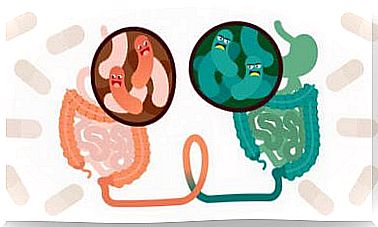The Diet Of Children With Crohn’s Disease

For Crohn’s disease sufferers it is important to follow a specific diet to relieve symptoms and avoid worsening. If your child suffers from this disease, read this article: we show you what the diet of children with Crohn’s disease should be.
What is Crohn’s disease?
Crohn’s disease is a type of inflammatory bowel disease whose origin, although attributed to several factors, is unknown. It is more common among young adults, although it can also affect children.
What are the symptoms?
It is characterized by inflammation of the mucous membrane of a delimited area of the intestine, which occurs with internal lesions whose appearance is unpredictable. It occurs with the alternation of more or less prolonged stomach pains during which the activity of the disease is stable.
Crohn’s disease can have symptoms and complications that affect the patient’s quality of life, especially during the acute phases. The main symptoms of Crohn’s disease are mostly intestinal and are:

- Abdominal pain.
- Frequent stools, chronic diarrhea.
- Damage to the anal region (fissures, fistulas, abscesses).
- Fatigue.
- Loss of appetite and weight, which often occur during the acute phases.
The diet of children with Crohn’s disease
Epidemiological studies have shown that some foods are able to play a protective role. Instead, the consumption of other foods increases the cases of the disease.
For example, breastfeeding has been shown to be a protective factor against the onset of the disease, possibly thanks to the benefits of immunoglobulins present in milk and antibodies produced by the mother. Breast milk also contains oligosaccharides, which promote the growth of beneficial bacteria for the intestine.
Clearly, the diet of children with Crohn’s disease varies according to whether they are in an asymptomatic or acute phase.
Diet during the asymptomatic phase
Foods to avoid:
- Flatulent foods such as cabbage, cauliflower, whole grains, carbonated drinks, legumes with skin.
- Cured meat.
- Butter, milk and cheese.
- Foods that contain sorbitol: candies, chewing gum, light drinks.
Foods to boost:
- Blue fish, rich in Omega 3. Omega 3 prevents disease, as it is anti-inflammatory.
- White fish, white meat and lean pork.
- Avocado and olive oil, as they are rich in vitamin E, which helps keep the internal mucous membranes of the digestive system hydrated.
- Papaya, mango, carrot, pumpkin, for their contribution of beta carotene.
- Probiotic foods, such as yogurt or kefir.
Diet during the acute phase
During the acute phase, the diet must be modified according to the type of discomfort. Normally, the diet in this phase should be high in calories, low in fat and high in protein, also low in fiber, anti-inflammatory, moisturizing and easily digested. The recommendations are as follows:

- Avoid the consumption of insoluble fiber such as whole grains, fruit peel and legumes.
- Do not eat foods rich in animal fats and saturated: butter, margarine, cream, red meat, cold cuts, sweets, cheeses.
- Follow a gluten and lactose-free diet, especially in case of diarrhea.
- Eat foods that provide soluble fiber in small quantities: quince jam, boiled or roasted apple and pear, boiled carrot.
- Drink water, vegetable broth or oral serum.
Nutritional complications
A child who has Crohn’s disease may have low weight and stunted growth. Deficiencies of some specific nutrients are also frequent, resulting in problems such as anemia or low bone mineral density. So, if your child is underweight, keep these recommendations in mind:
- Instead of drinking milk alone, it is best for the child to drink a smoothie, with fruit and cereals.
- Fruit can be accompanied by yogurt, if tolerated, and by nuts.
- Add oil abundantly to the dishes.
- Eat foods with a pasty texture, which are sometimes better tolerated.
- Add homemade sauces to meat or fish, but without the base being milk or cream.
Crohn’s disease is a complicated disease, which varies according to each child and the stage they are in, so it is not important to see a doctor.









